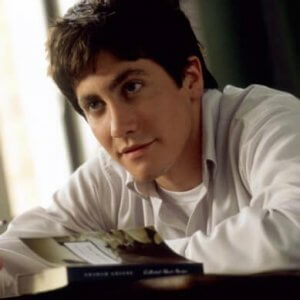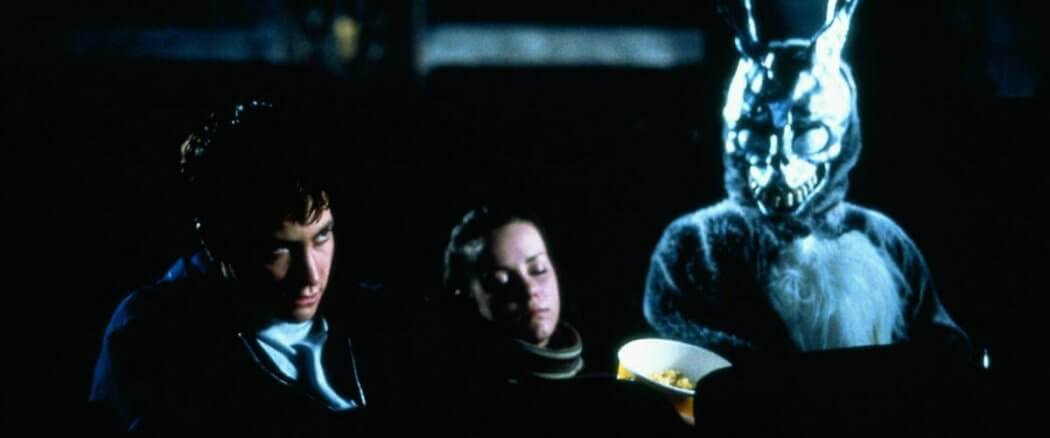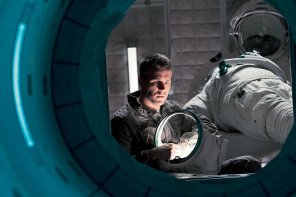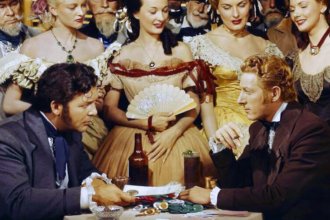Every so often, amidst the swirling array of conventional blockbusters, comes a film that defies description; one able to transcend genres and provide an experience like no other. Donnie Darko is the latest entry in this all too meager list of “out-of-the-box” films where creativity takes precedence over convention; genuine surprise over body count. In an age of complacent film-making, Darko is not only a breath of fresh air, but altogether one of the best movies ever made.
Welcome to the year 1988 – a time when conversations can range from politics (Dukakis vs. Bush) to the sex-lives of Smurfs (don’t ask). The main character of the story is Donnie, played flawlessly by Jake Gyllenhaal. Donnie is a troubled teen undergoing the typical woes of girls, school, and loneliness in the small town of Middlesex. However, Donnie also experiences some more unusual problems – vivid hallucinations and depression.
One night, Donnie is visited by a large creature in a bunny suit named Frank who tells him the world will end in 28 days. Is Frank merely a figment of Donnie’s imagination? What happens when the 28 days are up? The answers will repeatedly surprise you, and will no doubt leave a number of viewers scratching their head when the lights go up.
But what differentiates Darko from other films that have attempted to entrance and confound the audience, is the endearing nature of these characters. The movie isn’t a gimmick, like 1997’s The Game, but rather a rich world of interesting inhabitants where anything is possible.
The Darkos
The way the Darko family interacts with one another is particularly fascinating. From brother and sister fights at the dinner table to playful conversations behind closed doors – this is a family that has problems, but remains likable nonetheless. The most refreshing aspect was the chemistry between Donnie’s parents. I can’t think of another film about teenagers where we actually see the parents love each other. Too often, authority figures are relegated to the role of “the enemy” or used as convenient puppets to advance the story.
The other characters outside the Darko family are equally interesting. Donnie’s friends are the most one-dimensional of the bunch, but still manage to provide a handful of memorable lines. Noah Wyle fits the bill nicely as Donnie’s science teacher and Jena Malone gives a heart-felt performance as Donnie’s love interest, Gretchen. While the chemistry between the two isn’t exactly electrifying, it’s a perfect example of the subdued and innocent relationships we encounter in our youth.
 Still, without question, this movie belongs to Gyllenhaal. Injecting the perfect blend of humor and despair into every scene, Donnie becomes a character we both adore and identify with. This may not be Gyllenhaal’s best performance, but considering he was only 20 years old at the time, he displays a surprising amount of raw talent and depth. Darko is a movie that singlehandedly rests on its lead, and Gyllenhaal is more than up to the task.
Still, without question, this movie belongs to Gyllenhaal. Injecting the perfect blend of humor and despair into every scene, Donnie becomes a character we both adore and identify with. This may not be Gyllenhaal’s best performance, but considering he was only 20 years old at the time, he displays a surprising amount of raw talent and depth. Darko is a movie that singlehandedly rests on its lead, and Gyllenhaal is more than up to the task.
But the film would be nothing without the man behind the lens. Amazingly, this is Richard Kelly’s directorial debut. Yet every inch of the movie feels like the product of a seasoned veteran. Employing intricate camera angles, seamless effects, and perfectly chosen 80’s music, Kelly’s film dances around perfection. He’s also written an exceptional script that revels in both vision and ambiguity.
This is a film that beckons multiple viewings and endless discussion, while still providing enough clues for viewers to form solid theories. If you don’t like movies that stimulate the intellect and demand your undivided attention, avoid Darko like the plague. For those willing to engage with it, however, the results are surprisingly rewarding.
Masks
Behind the labyrinthine plot of Darko, some important themes are at play. The search for meaning in a meaningless world, the toil of faith without sight, and the battle between fate and free will are all touched on. But I think what Darko tackles best is the folly of putting on masks in our relationships with others. Toward the end of the film, Donnie’s chosen outfit for Halloween is a skeleton suit. This costume represents one of Donnie’s greatest strengths: transparency. Whatever Donnie thinks, he says. Whatever he feels, he expresses. There is no difference between who Donnie is on the inside and who he is on the outside.
Unfortunately, that’s not the case for his fellow Middlesex inhabitants. Donnie is surrounded by people who have perfected the art of putting on masks. People who appear to have life all figured out, but inside are empty tombs.
The Pharisees were like this, and we are like this too. “How are you doing?” people ask. “Fine,” we answer. But most of the time, we’re not fine. We’re broken. We’re desperate. We’re lost. Our masks are comfortable, but they’re eating us alive. It’s high time we were more like Donnie – hungry for honesty, alergic to pretention, and unashamed to admit we can’t do this life alone.
In the end, Donnie Darko has a bit of something for everyone – humor, horror, suspense, science fiction, and even tender romance. Add to the mix some deep truths, and you have a tour de force. This is a film to be cherished; a mind-blowing work of art that reminds us why we love movies in the first place.





